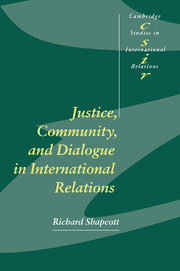Book contents
- Frontmatter
- Contents
- Acknowledgements
- Introduction
- 1 Beyond the cosmopolitan/communitarian divide
- 2 Community and communication in interpretive theories of international relations
- 3 Emancipation and legislation: the boundaries of conversation in poststructuralism and the critical theory of IR
- 4 Philosophical hermeneutics: understanding, practical reasoning and human solidarity
- 5 Philosophical hermeneutics and its critics
- 6 Towards a thin cosmopolitanism
- Conclusion
- Bibliography
- Index
- CAMBRIDGE STUDIES IN INTERNATIONAL RELATIONS
1 - Beyond the cosmopolitan/communitarian divide
Published online by Cambridge University Press: 22 September 2009
- Frontmatter
- Contents
- Acknowledgements
- Introduction
- 1 Beyond the cosmopolitan/communitarian divide
- 2 Community and communication in interpretive theories of international relations
- 3 Emancipation and legislation: the boundaries of conversation in poststructuralism and the critical theory of IR
- 4 Philosophical hermeneutics: understanding, practical reasoning and human solidarity
- 5 Philosophical hermeneutics and its critics
- 6 Towards a thin cosmopolitanism
- Conclusion
- Bibliography
- Index
- CAMBRIDGE STUDIES IN INTERNATIONAL RELATIONS
Summary
we want equality without its compelling us to accept identity; but also difference without its degenerating into superiority/inferiority. We aspire to reap the benefits of the egalitarian model and of the hierarchic model; we aspire to rediscover the meaning of the social without losing the quality of the individual.
In recent years the question of community in IR has been discussed increasingly in terms of a cosmopolitan/communitarian divide. According to Chris Brown the cosmopolitan/communitarian divide concerns argument over whether the state or the species represent the limit of human community. Cosmopolitans, Brown argues, place ultimate moral significance on the individual and the species, while communitarians situate it in the local or national community, or the individual's relationship to the community. Central to this debate have been the questions of universal justice and cultural diversity. As it presently stands, the formulation of the problem of community in IR suggests that these two goals are necessarily oppositional. Cosmopolitanism, on one hand, is seen as championing universal justice and membership of the human community at the expense of cultural diversity and membership of particular communities. On the other, communitarianism is seen to be hostile to universal projects and sees any attempt to develop universal moral vocabularies as necessarily destructive of the particular communities in which people exist.
- Type
- Chapter
- Information
- Publisher: Cambridge University PressPrint publication year: 2001

